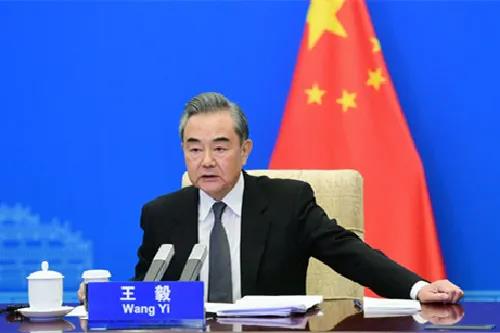CATTI-题库-真题-模拟-课程-直播
 外交部
外交部
 2021-05-28
2021-05-28

 963次
963次

秉持开放包容心态,高举多边主义旗帜,共建人类命运共同体
Staying Open and Inclusive and Upholding Multilateralism: Toward a Community with a Shared Future for Mankind
——王毅国务委员兼外长在慕尼黑安全会议中国专场活动的视频讲话
– Video Remarks by State Councilor and Foreign Minister Wang Yi at the Munich Security Conference Conversation with China
2021年5月25日
25 May 2021
尊敬的伊辛格主席,
加布里尔先生,莫盖里尼女士,
各位朋友:
Your Excellency Chairman Wolfgang Ischinger,
Mr. Sigmar Gabriel,
Madam Federica Mogherini,
Dear Friends,
感谢慕安会举办“和中国对话”专场活动,很高兴同各位新老朋友在线上相聚。
Let me begin by thanking the Munich Security Conference (MSC) for hosting this conversation with China. It gives me great pleasure to meet friends old and new via video link.
去年2月,我曾应邀在慕安会发表演讲,当时中国正在抗疫前线顽强奋战,国际社会给予了中国宝贵支持,我们始终铭记在心。一年多过去了,疫情仍在持续,对世界造成重大冲击,给人类带来深刻改变。当前,无论是继续携手抗疫,还是共同开创疫后新的未来,都需要各国进一步相互敞开心扉,加强团结合作。
When I spoke at the MSC in February last year, China was in the middle of the fight against COVID-19. The global community gave us much valued support as we fought on the front line of the battle, and that shall always remain deep in our heart. Now, one year on, the pandemic is still raging and bringing significant implications to the world and profound changes to humanity. As we continue to join hands both in fighting the pandemic and in ushering in a new future after COVID-19, it is high time countries opened up still further to each other and pursued even greater solidarity and cooperation.
最近一段时间,国际上包括欧洲有不少对中国发展道路和对外政策的关切,其中既有客观理性的认识,但也有不少疑虑和误解。我愿借此机会,先向各位介绍中国的想法,也愿听取大家的意见。
There have been some concerns expressed, including in Europe, about China’s development path and foreign policy. While some are fair and reasonable, some are misgivings and misunderstandings. I wish to take this opportunity to first give you China’s perspective and then hear your thoughts.
首先,中国的发展是人类的进步,而不是世界的威胁和挑战。
First, China’s development is for the progress of humanity, not to challenge or threaten the world.
今年恰逢中国共产党成立100周年。理解中国的发展,关键在于客观把握中国的历史,正确看待中国共产党。作为一个有五千年文明的古老民族,我们有过辉煌,也经历过苦难。特别是近代以来,在帝国主义、殖民主义的侵略掠夺下一度濒临亡国灭种的危险境地。为了救亡图存,中国人民尝试了人类几乎所有的政治模式,包括君主立宪、议会制、多党制、总统制等等,但均以失败而告终。最后,是中国共产党把马克思主义同中国实际结合起来,团结带领全体中国人民,实现了民族独立和解放,并最终找到了一条走向繁荣富强的正确道路,这就是中国特色社会主义。特别是近年来,在以习近平同志为核心的党中央领导下,中国的发展又取得一系列历史性成就,中国特色社会主义进入了新时代。
This year, we celebrate the 100th year of the founding of the Communist Party of China (CPC). To understand China’s development, it is essential to have a good understanding of China’s history and the CPC. As an ancient nation with a 5,000-year civilization, China has had its glory days and been through trials and tribulations. In modern times in particular, the Chinese nation was thrown almost to the brink of extinction as a result of aggression by imperialism and colonialism. To save the nation, our forefathers explored and exhausted almost all political models available at the time, including constitutional monarchy, parliamentarism, multi-party system and presidential system, and yet all ended up in failure. Finally, it was the CPC that adapted Marxism to the Chinese context and rallied and led the Chinese people to achieve national independence and liberation. A right path was found to prosperity and strength, a path of socialism with Chinese characteristics. In recent years in particular, under the leadership of the CPC Central Committee with Comrade Xi Jinping at its core, China has scored a succession of historic achievements in its development, and socialism with Chinese characteristics has entered a new era.
这条道路,是一条自强不息的发展之路。新中国成立以来,我们用短短几十年时间,使积贫积弱的中国成长为世界第二大经济体。我们用全球9%的耕地养活了世界近20%的人口,形成了4亿以上的中等收入群体,建成了世界规模最大的社会保障和义务教育体系。过去几百年,迈入现代化的国家,人口规模有百万级、千万级、上亿级,而14亿中国人加快走向现代化,这本身就是人类发展史上的里程碑,更是中国为世界进步作出的历史性贡献。
This is a path of development that features constant self-renewal. In just a few decades since the founding of New China, we managed to turn the country from being poor and weak into the second largest economy in the world. We have supported nearly 20 percent of the world’s population with only 9 percent of the world’s total arable land; we now have a middle-income group counting over 400 million people; and we have put in place the world’s largest social security and compulsory education systems. For countries that have achieved modernization over the past centuries, their populations ranged from millions to tens of millions, or hundreds of millions, to say the most. For China, the near completion of modernization, with its 1.4 billion people, is in itself a milestone in human development and, more importantly, a historic contribution to the progress of the world.
这条道路,是一条坚定不移的和平之路。作为曾经饱受侵略扩张之苦的国家,中国深知和平的宝贵。因此,我们从一开始就决定摈弃传统大国走过的老路,始终奉行独立自主的和平外交政策。新中国成立70多年来,我们从未主动挑起一场战争,从未侵占别国一寸土地,并成为世界上唯一将和平发展写进宪法的国家。中国是世界上边界最长、邻国最多、历史纠葛最复杂的国家,但我们坚持通过和平谈判与14个陆地邻国中的12个完成了划界勘界。对于仍然存在的领土和海洋权益争议,我们已承诺继续通过谈判协商解决争端,不使用武力或以武力相威胁。中国的外交辞典里从来没有“胁迫”、“霸凌”这样的词汇。作为一个迅速发展的大国,中国坚持与各国和平共处,坚持不称霸、不扩张、不胁迫,这无疑是对世界战略稳定的重大贡献。
This is a path of peace that features an unwavering commitment. As a country that has suffered so much from foreign aggression and expansion, China knows the value of peace. Hence, from the very beginning, we are determined not to tread on the beaten path of traditional powers. Instead, we are committed to an independent foreign policy of peace. For the last 70-plus years since the founding of the People’s Republic, China has never started a war or encroached upon a single inch of foreign soil. China is the only country that has codified peaceful development in its constitution. China has a longer boundary, more neighboring countries, and more historical complications than any other country in the world. Through peaceful negotiations, China has delineated and demarcated boundaries with 12 of its 14 land neighbors. Regarding outstanding disputes over territory and maritime rights and interests, China has pledged to seek negotiated settlement without resorting to the use or threat of force. In China’s diplomatic vocabulary, there is no place for words like “coercion” or “bullying”. China is a fast-growing major country that is committed to peaceful co-existence with all countries and to non-hegemony, non-expansion and non-coercion. This is an irrefutable major contribution to global strategic stability.
这条道路,是一条惠及全球的合作之路。中国始终张开双臂拥抱世界,做国际社会可靠的合作伙伴。欧债危机暴发后,中国坚定支持欧元区应对危机。气候变化问题上,中方坚持维护巴黎协定的权威性、有效性。面对保护主义抬头,中国连续三年举办进口博览会,让各国分享中国机遇。我们致力于以更短的负面清单、更好的营商环境、更高标准的制度型开放,向世界敞开中国市场。中国提出“一带一路”倡议7年多来,与伙伴国贸易总额超过7.8万亿美元,直接投资超过1100亿美元,不少欧洲企业从中受益。中欧班列开行10年,单月开行已达到千列以上,成为各国携手抗疫、共促复苏的生命通道。世界银行报告认为,到2030年,“一带一路”有望帮助全球760万人摆脱极端贫困、3200万人摆脱中度贫困。
This is a path of cooperation that features benefits for the whole world. China has always embraced the world with open arms and acted as a trustworthy partner of the international community. In the wake of the European debt crisis, China firmly supported the eurozone’s response to the challenge. On climate change, China upholds the authority and effectiveness of the Paris Agreement. In the face of mounting protectionism, China has hosted the China International Import Expo for three years running to share its opportunities with the rest of the world. We are committed to employing a shorter negative list and to putting in place a better business environment and even higher-standard institutional opening-up so that the China market will be more open to the world. Since the Belt and Road Initiative (BRI) was launched seven years ago, China has registered more than 7.8 trillion US dollars in trade and 110 billion US dollars in direct investment with BRI partner countries, benefiting European companies among others. The China-Europe Railway Express, now in its 10th year and running some 1,000 services every month, has become a lifeline connecting countries as they fight COVID-19 and promote recovery. A World Bank report suggests that by 2030, globally, the Belt and Road Initiative could contribute to lifting 7.6 million people from extreme poverty and 32 million from moderate poverty.
中国发展从不以牺牲他国利益为代价,而是注重合作共赢。中国已连续10多年对世界经济增长贡献率超过30%,对全球减贫贡献率超过70%。2008年以来,中国吸收了最不发达国家25%的出口,是G20成员中落实“暂缓最贫困国家债务偿付倡议”金额最大的国家,为缩小南北差距作出了切实努力。面对全球新冠肺炎疫情,我们向150多个国家和13个国际组织提供急需的抗疫物质,迄今已供应了2800多亿只口罩、34亿多件防护服、40多亿份检测试剂盒。中国率先承诺疫苗是全球公共产品,已向全球提供3亿剂。在不久前举行的全球健康峰会上,习近平主席围绕资金援助、疫苗提供、疫苗合作生产、知识产权豁免等提出新的五大举措,为共建人类卫生健康共同体提供强大助力。
China’s development has never been at the expense of other countries’ interests; it has always focused on mutual benefit and cooperation. For over 10 years, China has contributed to more than 30 percent of global growth and more than 70 percent of global poverty reduction. Since 2008, China has received 25 percent of exports from the least developed countries and put off more loan repayment under the Debt Service Suspension Initiative for Poorest Countries than other G20 members. These are real efforts toward narrowing the North-South gap. During the COVID-19 pandemic, China has provided urgently needed supplies to 150-plus countries and 13 international organizations, including more than 280 billion masks, 3.4 billion protective suits, and 4 billion testing kits. China is the first to pledge making vaccines a global public good, and has so far provided 300 million doses to the world. At the recent Global Health Summit, President Xi Jinping announced five new measures, including providing financial aid, supplying vaccines, carrying out joint vaccine production, and waiving intellectual property rights on vaccines. These measures will lend a strong impetus to the building of a global community of health for all.
当然,中国发展的任务依然很重,道路依然漫长。目前中国人均GDP才刚过1万美元,排在世界60多位,和大多数欧洲国家相比差得还远。作为世界上最大的发展中国家,中国首要的任务仍然是集中力量发展自己,解决好人民日益增长的美好生活需要和发展不平衡不充分这一主要矛盾。我们将构建新发展格局,推进更高水平的改革开放,实现更高水平的合作共赢。中国必将成为更好的自己,世界也必将因中国而更美好。
That said, China’s development remains a long and arduous journey. Our per capita GDP, just a little over 10,000 US dollars, ranks after the 60th in the world, far behind most European countries. The primary task for this biggest developing country in the world is to concentrate on developing itself and addressing the principal contradiction between China’s unbalanced and inadequate development and the Chinese people’s ever-growing needs for a better life. Our plan is to foster a new development paradigm, advance reform and opening-up of a higher standard, and pursue win-win cooperation of higher quality. China will achieve even better development, and the world will become a better place with China’s development.
第二,中国是世界各国可信赖的伙伴,而不是相互对抗的制度性对手。
Second, China is a trustworthy partner of all countries, not a systemic rival locked in confrontation.
近年来有种论调,称中国道路制度的成功将对西方造成冲击和威胁。欧洲也有不少人将中国定义为所谓的“制度性对手”。对此,我们不能认同。一个国家实行什么样的制度,并不存在放之四海皆准的模板。各国历史文化和社会制度不同,如同中餐和西餐、筷子和刀叉,各有存在的理由。不同的社会制度并不必然成为竞争对手,不同的发展道路也不必然妨碍互利合作。
In recent years, some have talked about China’s successful path and system as being a shock and threat to the West. In Europe, quite some people have defined China as a “systemic rival”. This is something we cannot agree with. As for what system a country may adopt, there is no one-size-fits-all model. Countries differ in history, culture and social system, just like the food that is different in the Chinese and Western cuisines that use either chopsticks or knife and fork - each is there for its own particular reason. Different social systems do not necessarily make countries rivals, nor do different development paths entail sure obstruction to mutually beneficial cooperation.
过去几十年来,中国同西方的关系总体保持合作态势,给双方及世界都带来了巨大红利。第一个和新中国建交的西方国家和西方大国都来自欧洲。50年前中国恢复联合国合法席位时,欧洲国家基本都投了赞成票。2003年中国和欧盟建立起全面战略伙伴关系。当时欧洲各国就知道是在和一个与自己制度不同的国家打交道,但还是作出了独立自主的正确选择。这充分证明,只要做到相互尊重,谋求互利合作,完全可以超越国家间的制度差异。几十年后的今天,唯一的变化就是中国发展起来了,但如果西方因此就把中国视作对手和威胁,心态未免有些过于狭隘。对于中国而言,我们一向既有制度上的自信,也有文明上的包容。中国将坚持自己选择的制度和发展道路,同时也充分尊重其他国家的自主选择,决不会搞什么制度输出和制度竞争。中国始终认为,多样性是人类社会的基本特征,多元化是世界发展的重要动力,不同制度之间可以包容互鉴,美美与共。
Over the past decades, China’s relations with the West have on the whole maintained a momentum of cooperation, and that has enormously benefited both sides and beyond. The first Western country and the first major Western country to establish diplomatic relations with China were both European countries, and European countries almost all voted in favor of restoring China’s lawful seat at the United Nations 50 years ago. When China and the European Union established comprehensive strategic partnership in 2003, European countries had the knowledge that they were engaging a country with a much different system, and it did not stop Europe from making the right and independent decision. What it fully demonstrates is that as long as countries respect each other and pursue mutually beneficial cooperation, they could rise above their different systems. Today, several decades on, the only thing that is different with China is its development. The West would seem rather narrow-minded should it choose to view China as a rival and threat because of its development. For China, we have always been confident in our own system and inclusive toward other cultures. China will stick to the system and development path it has chosen and, at the same time, fully respect the independent choices of other countries. China will never export its system or engage in systemic competition. We always believe that diversity is a defining feature of human society, and pluralism an important driver behind global development. Different systems can all succeed through mutual accommodation and mutual learning.
现在还有人刻意将中西方关系渲染为“民主和威权”之争,这种用价值观划线的做法本身就不客观、不理性、不民主。中方认为,和平、发展、公平、正义、民主、自由,是全人类的共同价值,是各国追求的共同目标,不能将其标签化,不能只是部分国家的专利。中国共产党自诞生起就追求中国人民的民主和自由,维护和保障人权已写入中华人民共和国的宪法。而各国国情千差万别,民主、人权的具体实践也丰富多彩。衡量的标准就是要看本国人民是否满意,是否高兴。
Some people, out of certain intention, have tried to portray China’s relations with the West as a competition between democracy and authoritarianism. Such an act of drawing lines between values is hardly objective, rational or democratic. China believes that the values of peace, development, equity, justice, democracy and freedom are all shared values of humanity and the common goals of all countries. They must not be labeled as the patent of only a few countries in the world. Since the CPC was founded, it has been committed to pursuing democracy and freedom for the Chinese people. Upholding and protecting human rights has been written into the constitution of the People’s Republic of China. As countries differ in national realities, the practices of democracy and human rights also vary from country to country. The key judgment is whether the people are satisfied and happy.
中国的人权怎么样,中国人民最有发言权。过去70多年来,中国有超过8.5亿人口摆脱了贫困,人均预期寿命从35岁增至77岁。人类发展指数从1978年的0.410上升到2018年的0.758,是联合国发布该指数以来唯一从低人类发展水平跨越到高人类发展水平的国家。多年来,很多西方研究机构的独立民调结果都一致显示,中国共产党和中国政府在本国民众中的支持率和满意度在世界各国中始终高居榜首。
How is China doing on human rights? No one is a better judge than the Chinese people themselves. In the last seven decades and more, over 850 million Chinese have been lifted out of poverty and average life expectancy has surged from 35 to 77 years. With its Human Development Index rising from 0.410 in 1978 to 0.758 in 2018, China is the only country that has completed the transition from low to high human development since the United Nations launched the Index. Many independent opinion polls conducted by Western research institutes over the years have invariably placed the approval and satisfaction ratings of the CPC and the Chinese government among the Chinese people at the top of world rankings.
在大家比较关注的中国新疆地区,人权事业更是取得了巨大发展。新疆经济总量迄今增长了200多倍,人均GDP增长了近40倍,300多万人口摆脱贫困。2007年至2018年,新疆维吾尔族人口从965万增至1272万人,增加了300多万,增幅31.8%。所谓新疆“种族灭绝”的指控,违背事实和常识,挑战智商和良知。很多实地走访过新疆的国际人士,都对这种谎言予以了公开驳斥。
To take China’s Xinjiang region for an example. I know this is of much interest to many. Xinjiang has seen substantial development in human rights. Its GDP has grown over 200 times, or nearly 40 times in per capita terms. More than three million people have graduated from poverty. Between 2007 and 2018, the Uygur population in the region grew from 9.65 million to 12.72 million, an increase of over three million or 31.8 percent. The allegation of a “genocide” in Xinjiang is against the facts and common sense. It is a stray from human intelligence and conscience. Many foreign friends who have been to Xinjiang have openly denounced such allegations.
第三,中国愿同欧洲和世界各国践行真正的多边主义,维护以联合国为核心的国际体系。
Third, China is ready to work with countries in Europe and the wider world to practice true multilateralism and uphold the UN-centered international system.
现行国际体系与秩序的核心理念是多边主义。多边主义践行得好,人类福祉就得以维护和发展。多边主义遭受冲击,世界就会乱象丛生,退回到丛林法则。过去几年,单边主义肆虐横行,某个超级大国大搞“本国优先”,动辄“退群”“毁约”,挥舞单边制裁大棒,给国际秩序和全球治理造成严重干扰破坏。当时,正是中国和欧洲共同站了出来,以实际行动维护了多边主义,防止世界走向对抗和分裂。
The principle lying at the core of the existing international system and order is multilateralism. When multilateralism is well observed, the well-being of humanity gets preserved and advanced. When multilateralism is under attack, chaos breaks out and the law of the jungle returns. The past few years saw unilateralism running unchecked. A superpower had chosen to put its own interests above other things. It turned its back on a host of international organizations and treaties, and wielded the stick of unilateral sanctions, causing serious disruption to international order and global governance. Against such a backdrop, China and Europe rose to the challenge. Together, our two sides defended multilateralism with concrete actions, and prevented the world from heading toward confrontation and division.
当前,面对百年变局和世纪疫情,联合国193个成员国不是193条船,而是一条船上的193个水手,必须同舟共济,齐心协力,团结在多边主义旗帜下,增强命运共同体意识,才能冲过急流和险滩。什么是多边主义,如何践行多边主义?我们欢迎各国就此开展讨论。中方认为,真正的多边主义,离不开联合国,要坚定维护以联合国为核心的国际体系;离不开国际法,要坚定维护以国际法为基础的国际秩序;离不开各国合作,大国必须带头主持公道、厉行法治、承担责任、聚焦行动。我们要警惕具有一定迷惑性的“伪多边主义”。表面上打着重回多边主义的旗号,实质上是要搞“小圈子”和集团政治,甚至要以意识形态站队、阵营之间选边来割裂世界。我们多次听到要维护“基于规则的国际秩序”,关键是所谓“规则”是什么?如果说的是《联合国宪章》和国际法,那么大可不必言必称“规则”。如果指的是几个或部分国家制定的规则,那就是要把少数人的意志强加给多数人,就不是真正的多边主义。
Today, in a world experiencing changes and a pandemic both unseen in a century, the 193 UN member states must not see themselves as 193 separate boats, but 193 sailors onboard the same boat. To successfully navigate rapids and hidden shoals, we must pull together in solidarity, stay united for multilateralism, and heighten the awareness that we are a community with a shared future. Here come the questions: What is multilateralism? How to practice multilateralism? We welcome discussions among countries. In China’s view, true multilateralism cannot be achieved without the United Nations and a firm commitment to upholding the UN-centered international system. True multilateralism cannot be achieved without international law and a firm commitment to maintaining the international order built upon it. And true multilateralism cannot be achieved without international cooperation and a commitment of major countries to lead by example in upholding justice, following the rule of law, undertaking responsibilities, and focusing on actions. We must guard against “pseudo-multilateralism”. Sheer talk of returning to multilateralism may hide a real scheme to form small circles and conduct group politics, and to even divide the world along ideological lines and force countries to pick sides. We have heard talks about the need to uphold the “rules-based international order”. The crux of the matter is: What kind of “rules” are being talked about? If they mean the UN Charter and international law, repetitious references to the “rules” sound rather redundant. If they only mean rules set by several or a group of countries, that would amount to imposing the will of the minority on the majority. That is not true multilateralism.
实践是检验真理的唯一标准,一个国家是不是真正奉行和维护多边主义,关键是看做了什么。中国作为第一个在《联合国宪章》上签字的国家,迄今已加入了几乎所有政府间国际组织和500多项国际公约。我们从不退群毁约,也不要求别国选边站队,更从不拖欠联合国等任何国际组织会费。恢复联合国合法席位50年来,中国一直是联合国事业的“行动派”,已经成为联合国第二大会费与维和摊款国,派出维和人员最多的常任理事国。加入世贸组织20年来,中国总体关税水平已降至7.5%以下,低于绝大多数国家,市场准入负面清单已经缩短至33项,成为世界上开放程度最高的国家之一。
Practice is the sole criterion for testing truth. To judge whether a country is truly practicing and upholding multilateralism, one must look at what it is doing. As the first country to put its signature on the UN Charter, China has joined almost all inter-governmental organizations and over 500 international treaties. We have never walked away from international obligations, never asked others to pick sides, or owed arrears to the United Nations or any other international organization. For the past five decades since the restoration of its lawful seat at the United Nations, China has remained a “doer” in the various undertakings of this organization. China is now the second largest funding contributor to both the United Nations and UN peacekeeping operations and the top contributor of peacekeeping personnel among the permanent members of the Security Council. Since its accession to the World Trade Organization 20 years ago, China has cut its overall tariff rate to below 7.5 percent, lower than most countries in the world, and has shortened its negative list on market access to 33 items. This has placed China among the most open countries in the world.
中欧作为多极化进程中的两支重要力量,维护多边主义是双方最重要的共识之一,也就此肩负着共同责任。我记得莫盖里尼女士说过,“多边主义融在欧盟的DNA里”,强调“中欧应共同坚持多边主义,维护国际秩序,发挥稳定器作用”。对此我深表赞同。中方愿与欧方一道,作维护多边主义的表率,树立践行多边主义的标杆。
China and Europe are two major forces for multilateralism. Upholding multilateralism has been one of our most important common understandings and shared responsibilities. Madam Mogherini once said that multilateralism is the EU’s DNA and that China and the EU should adhere to multilateralism, safeguard international order, and play the role of a stabilizer in the world. I very much agree with her observation. China hopes to work with the EU to set an example for upholding and practicing multilateralism.
第四,中国愿本着相互尊重、互利共赢原则,同欧洲继续保持和拓展全方位合作。
Fourth, China is ready to maintain and expand all-round cooperation with Europe in the spirit of mutual respect and mutual benefit.
当前,围绕中欧关系的定位有各种议论,双方是竞争、对抗还是合作,彼此是对手、威胁还是伙伴?从中国的角度来说,我们的立场是一贯和明确的,那就是始终从战略高度看待中欧关系,始终认为合作是中欧关系的大方向和主基调,始终将欧方视为伙伴而非对手。我们将一如既往坚定支持欧洲一体化进程,支持欧盟团结自强,加强战略自主,在国际上发挥更大作用。我们也愿同欧洲在相互尊重、互利共赢基础上,拓展全方位合作,为中欧人民的福祉、为世界的和平与发展作出贡献。
There are now different kinds of talks about the nature of the China-EU relationship. Is it one of competition, confrontation or cooperation? Are the two sides each other’s rivals, threats or partners? China’s position is consistent and clear: We view China-EU relations from a strategic height, we see cooperation as the overall direction and keynote of China-EU relations, and we see Europe as a partner, not a rival. We will continue to support the European integration process. We support the EU in gaining greater unity, strength and strategic independence and in playing a bigger role in the world. We also stand ready to expand all-round cooperation with Europe on the basis of mutual respect and mutual benefit, which serves the interests of the Chinese and European people and peace and development in the world. In this context, I wish to highlight the following as priority areas of China-EU cooperation:
当务之急是加强抗疫合作,携手战胜世纪疫情。疫情延宕反复是国际社会面临的最突出挑战。中欧要继续在全球抗疫合作中发挥引领作用,加强疫苗、药物研发和生产合作,共同支持世卫组织、“全球疫苗免疫联盟”发挥作用,反对把疫苗政治化,反对搞疫苗民族主义,促进疫苗公平合理分配,帮助发展中国家提高防疫能力。
First and foremost, we need to step up cooperation against COVID-19 to beat this once-in-a-century pandemic. An ongoing pandemic with many twists and turns is the biggest challenge to the international community. It is important that China and Europe continue to lead global cooperation against the pandemic. The two sides may work more closely on the development and production of vaccines and medicines, support the World Health Organization and GAVI in playing their roles, oppose the politicization of vaccines, reject vaccine nationalism, promote more fair and equitable distribution of vaccines, and help developing countries enhance anti-epidemic capacity.
二是加强宏观政策协调,助力全球经济复苏。全球经济面临多重压力,新冠疫情未退,通胀压力又来。中欧作为主要经济体,要推动各方采取负责任的宏观经济金融政策,防范金融风险,反对保护主义,维护全球产业链、供应链畅通,为经济复苏注入更多确定性。
Second, we need to enhance coordination on macro-policies to boost global economic recovery. The world economy faces multiple challenges, including an ongoing pandemic and looming inflationary pressures. As two major economies, China and the EU need to call upon all sides to adopt responsible macro-economic and financial policies, watch out for financial risks, oppose protectionism, and keep global industrial and supply chains unclogged. These efforts will help increase certainty in economic recovery.
近日欧洲议会通过动议,以新疆问题为由冻结中欧投资协定的审议。我想强调,中欧投资协定高度互利,不是单方面的照顾和恩赐,而涉疆问题事关中国主权安全。欧方一些人将不同性质的问题任意挂钩,把经贸问题政治化,这不可接受,也绝对行不通。中欧合作是大势所趋,在中欧之间搞政治对抗和经济脱钩,不符合欧方利益,也不可能长久。
The European Parliament has recently passed a motion pushing for the freeze of the EU’s investment agreement with China, citing Xinjiang as the reason. I want to stress that with a high level of mutual benefit, the investment agreement is not a one-sided favor. The Xinjiang-related issue bears on China’s sovereignty and security. Attempts by some in the EU to link up issues of different nature and turn trade issues into political ones are not acceptable and would lead nowhere. Cooperation between China and Europe represents the overriding trend. Stoking political confrontation and economic decoupling between our two sides does not serve Europe’s interests and will not go very far.
三是加强绿色数字合作,引领全球创新发展。绿色经济和数字经济代表着人类发展方向,中欧已经建立绿色合作、数字合作伙伴关系,应当发挥引领作用。我们要加强在循环经济、清洁能源、生物多样性等领域交流合作,相互支持双方的生态议程。要加强数字经济、大数据、云计算、人工智能、技术规则标准等领域的优势互补,共同推动制定全球数字治理规则,共同构建和平、安全、开放、合作、有序的网络空间命运共同体。中方提出了《全球数据安全倡议》,愿意听取欧方的有益建议。
Third, we need to enhance green and digital cooperation to lead innovation-driven development in the world. Green economy and digital economy represent the future of humanity. China and the EU have forged partnerships for green and digital cooperation. We are well positioned to lead on these fronts. We need to increase exchanges and cooperation in circular economy, clean energy and biodiversity, and offer mutual support to each other’s environmental agenda. We could seek greater complementarity in such areas as digital economy, big data, cloud computing, artificial intelligence, and technical rules and standards, promote the rule-making of global digital governance, and work together for a community with a shared future in cyberspace featuring peace, security, openness, cooperation and order. China has proposed a Global Initiative on Data Security. We will be happy to hear good suggestions from the EU side.
四是加强全球治理,共同应对全球挑战。当前,全球性问题层出不穷,全球治理改革进入深水区,中欧应加强在联合国、世贸组织、世卫组织等多边框架内的交流合作,推动全球治理体系朝着更加公正合理方向发展。不久前中法德领导人会晤就气候变化等重要议题达成战略共识,中欧应进一步沟通合作。中欧还应共同推动伊朗核、叙利亚、巴以、中东等热点问题的政治解决,维护地区和平稳定。
Fourth, we need to strengthen global governance to jointly address global challenges. Global challenges have kept emerging and global governance reform has entered a deep-water zone. China and the EU need to enhance communication and cooperation within multilateral frameworks including the UN, the WTO and the WHO, in a bid to make the global governance system more fair and equitable. At a recent video summit, leaders of China, France and Germany reached strategic consensus on climate change and other important topics. There should be further communication and cooperation to follow that through. China and the EU also need to promote the political settlement of hotspot issues, including the Iranian nuclear issue and those related to Syria, Palestine and Israel, and the Middle East, for the benefit of regional peace and stability.
五是加强人文交流,促进东西方文明交融。中欧作为两大文明,曾留下许多互学互鉴的佳话。我们要鼓励双方在文化、教育、学术、传媒等领域加强交流,增进相互了解,促进民心相通,避免虚假信息遮蔽真相,不让政治病毒破坏团结,为中欧关系行稳致远奠定坚实的民意和社会基础。奥林匹克精神源自欧洲,中欧应旗帜鲜明反对体育政治化。中方欢迎欧洲国家参加北京冬奥会,中国观众期待在北京看到欧洲运动员的精彩表现。
Fifth, we need to encourage people-to-people exchanges to promote interactions between Eastern and Western civilizations. China and Europe are two proud civilizations, whose mutual learning have left many widely-told stories. We need to encourage more cultural, educational, academic and media exchanges to better understand each other and bring our peoples closer. Such exchanges will also help prevent disinformation from covering up truth and political virus from eroding solidarity. They will cement the popular and social foundation for the steady growth of China-EU relations in the years to come. Europe is the birthplace of the Olympic spirit. Our two sides may stand together in denouncing the politicization of sports. China welcomes European countries to the 2022 Winter Olympics in Beijing, and Chinese audience are looking forward to cheering for the excellent performance of European athletes.
以上是我想讲的主要内容。下面,我愿听取两位老朋友,加布里尔先生和莫盖里尼女士的发言,也愿同伊辛格主席交流。谢谢!
So much for my account of the China perspective. Now it is my pleasure to listen to my old friends Mr. Gabriel and Madam Mogherini and to have a conversation with Chairman Ischinger. Thank you.

 点赞(0)
点赞(0)

 收藏
收藏

国务院扶贫办主任刘永富说,这几年发展了一些扶贫产业,比如苹果、核桃、大枣,这些产品陆续上市。由于疫情影响,国家发改委、供销社、农业农村部、商务部、中央网信办等单位共同做了一系列工作。
网络 2024-11-08 11:03:17
 收藏资讯
收藏资讯

垃圾分类在中国的推进情况,介绍了垃圾的四种分类标准,并回顾了北京和上海的垃圾分类政策进展。还提到了日本的分类经验。文章指出垃圾分类在中国的历史和实施中的挑战,尤其是依赖公众支持和有效管理。
网络 2024-11-08 10:58:40
 收藏资讯
收藏资讯

根据CATTI官方列出的历年通过率,CATTI三级笔译通过率比CATTI二笔考试通过率高些,在15%—30%之间,CATTI二级笔译考试通过率大概为8%—12%之间。
网络 2024-11-08 10:48:53
 收藏资讯
收藏资讯

根据CATTI官方列出的历年通过率,CATTI三级笔译通过率比CATTI二笔考试通过率高些,在15%—30%之间,CATTI二级笔译考试通过率大概为8%—12%之间。
网络 2024-11-08 10:40:36
 收藏资讯
收藏资讯